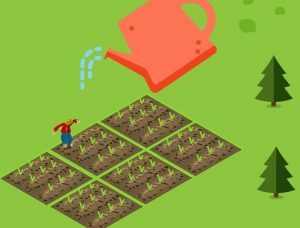
Irrigation is the method in which a controlled amount of water is supplied to plants at regular intervals for agriculture. It is used to assist in the growing of agricultural crops, maintenance of landscapes, and the re-vegetation of disturbed soils in dry areas or during periods of inadequate rainfall.
Irrigation has a long and significant history in the economy of the Bow River Basin, with the Western and Eastern irrigation districts dating back to the 1930s and 40s, and the Bow River Irrigation District since 1950. Agricultural production in Alberta is a significant part of the total Canadian agricultural production, much of which is facilitated by irrigation.
High-volume water users, including irrigation districts, divert water away from the mainstem of the river. This changes the volume of water in the river, which impacts the capacity of the river to dilute and/or assimilate substances (e.g., sediment, contaminants, nutrients). To read more about dilution and water quality click here.
Increased salt concentrations can be caused by seepage from irrigation canals and return flows from irrigated lands. High salinity can increase water treatment costs, corrode plumbing and reduce crop yields. Contaminated groundwater from percolation of irrigation water or seepage from irrigation systems can both recharge and negatively impact water quality of rivers. For example, the Colorado River receives 454 000 kg of salt annually.
Elevated concentrations of selenium in irrigation drainage water are linked to waterfowl deaths, deformities and reproductive failures.
The irrigation systems in Alberta are continually being updated to be more efficient with water use; improved efficiency of individual farm and ranch irrigation systems can also reduce water demand and runoff.
Much of the water demand in irrigation is determined by the weather and by the type of crop that is being grown. For the most part we cannot change the weather, but acting to limit climate change may help improve water quality and quantity in the long run.
We provide Canadian educational resources on water practices to promote conservation and sustainability. Our team crafts current and relevant content, while encouraging feedback and engagement.
The Canada WaterPortal is a registered charity, #807121876RR0001
We recognize and respect the sovereignty of the Indigenous Peoples and communities on whose land our work takes place.
© 2025 All Rights Reserved.